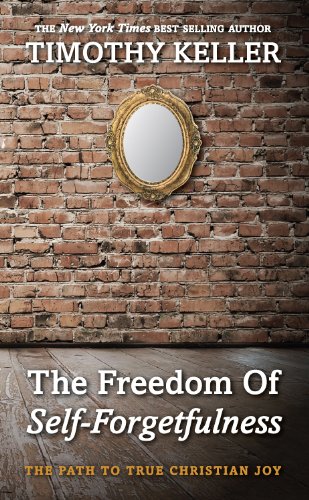Author Information
Tim Keller is a Pastor at Redeemer Presbyterian Church in New York. This book is the manuscript from his sermon on 1 Corinthians 3:_-4:7. Keller also has a heart for all things gospel-centered; hence, his prominence in The Gospel Coalition and other various para-church organizations. The Freedom of Self-Forgetfulness is about the implication of the gospel in addressing the broken ego.
What I have always admired about Tim Keller is the fact that he is “Presbyterian” but has publicly (as well as in practice) stated, “I’m pretty sure God is going to reach others through more than the Presbyterian Church” (paraphrase mine). The Freedom of Self-Forgetfulness is an example where the gospel, in its universality, is relevant not only to all denominations but to all people.
Ever human being has a broken ego; that is, an inner voice that is constantly comparing itself to others in prideful or self-condemning ways. In that sense, Keller writes this book for everybody (who is sick and tired of that inner nagging voice).
Overview of Content
The book begins with 1 Corinthians 3:21-4:7 where Paul gives an approach to self-regard, which is diametrically opposed to how people thought or now think of themselves. The following three chapters are extrapolated from the outline of the passage; namely, the natural condition of the human ego (i.e. empty, painful, busy and fragile), the transformed sense of self (not only being free from what other say about me, but also what I say about me!), and how to get that transformed sense of self (believing the truth of Romans 8:1 in that the verdict is over).
Once again the three sections can be broken down as follows. First, the natural condition of the human ego is brokeness. This brokenness manifests in numerous ways.
The ego is empty and is always trying to fill itself up on everything except God. In other words, it is an idol factory. The ego is painful in that it keeps drawing attention to itself like a painful toe. The only parts of our body that are in pain are the ones that draw attention to themselves. Since the ego never stops, it is proof positive that it is in pain.
This brings up the third flaw concerning the ego. It is busy in two particular areas; comparing itself to others and boasting in light of others. Keller makes a great point that nobody struggles with pride of being good looking, but rather the true issue is being proud that he/she believes they are better looking than the next person. All it takes is for someone better looking to come in and reveal that targeted pride towards others wishing their periphery was the real issue. Fourth and lastly, the ego is fragile. The example Keller gives of a fragile ego is Madonna who (unlike most people) admits no matter how much she accomplishes, she still feels mediocre and yearns to do something greater. She knows the reality of the empty, painful, busy and fragile ego in admitting, “My struggle has never ended and I guess it never will.”
The book ends with hope. What Madonna and now recently Tom Brady have been looking for; namely, the freedom of self-forgetfulness is found in the fact that their performance can be found in the verdict that came from the work of Christ on the cross. Every religion in the world has something in common - they believe that their performance can lead to a verdict; that is, that they will be accepted into heaven, nirvana, glory, etc, etc. The gospel is the exact opposite. The verdict frees us up to perform. The verdict determines our performance.
The verdict is this: There is therefore now no condemnation for those who are in Christ Jesus (Romans 8:1). For Paul, the verdict is over. No more self-condemnation. No more self-comparison. No more allowing the empty, painful, hurting, and fragile ego dictate what kind of day I am having. Paul is letting us know that we most certainly should not be defined by our broken egos. Our identity is found in Christ who brings the greatest news ever. The verdict is over. Case closed. Over and out. Ad infinitum!
Takeaway
I will expect my ego to rear its ugly head again tomorrow. But I stand on truth and will preach the gospel to myself. I will remind myself that the verdict is over. On the days that I do not remind myself of the gospel I am surrounded by friends who will do me that favor. If my friends are busy my wife and children will remind me. God will always remind me of the good work of Christ. The verdict is over and I am free to live the self-forgetful life. I am free to be a conduit of God’s grace, mercy, and peace. I am empowered to share the good news of the self-forgetful life.


No comments:
Post a Comment